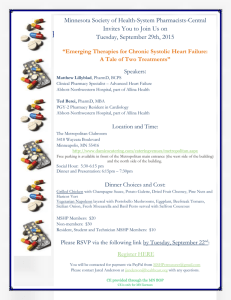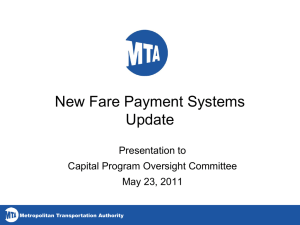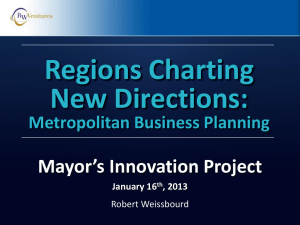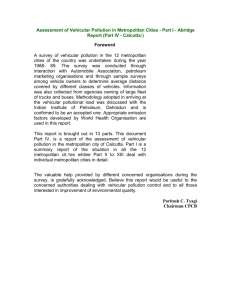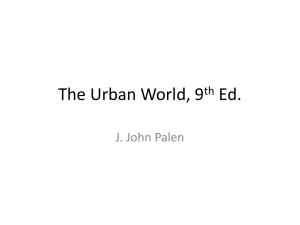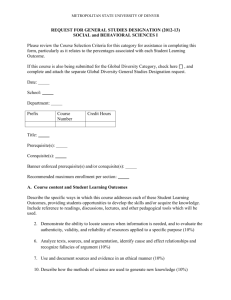Overview of Agency - Department of Health
advertisement
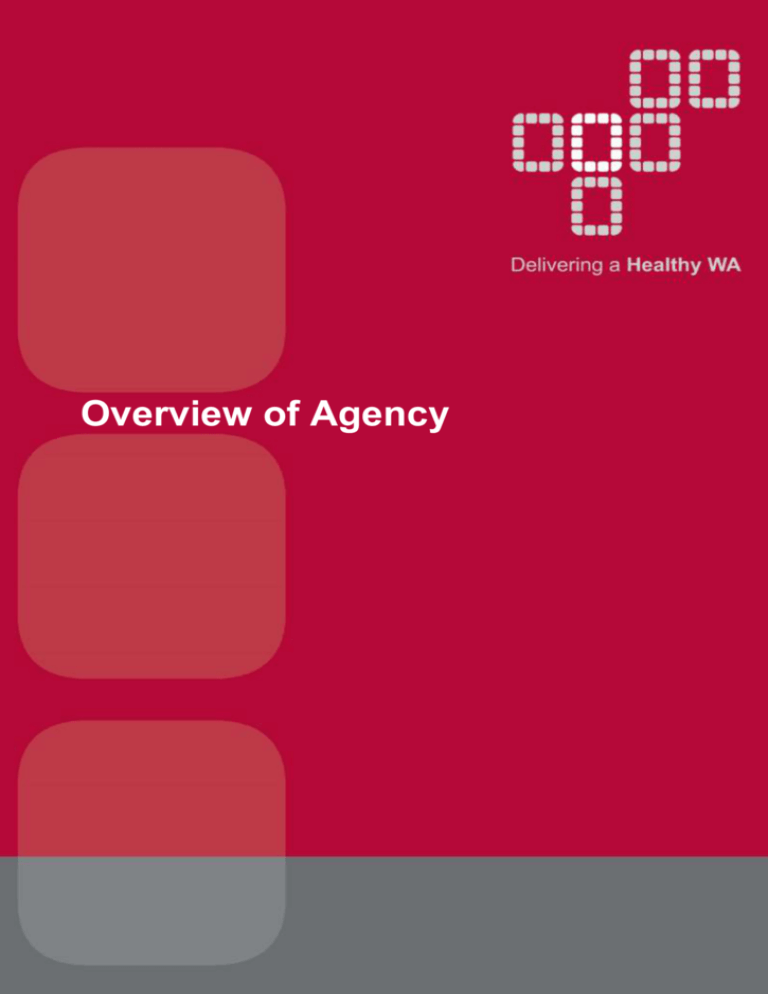
Overview Metropolitan Health Service Annual Report 2010-11 Overview of Agency Delivering a Healthy WA 9 Metropolitan Health Service Annual Report 2010-11 Overview Vision Statement Our Vision Our Mission Healthier, longer and better quality lives for all West Australians. To improve, promote and protect the health of Western Australians by: Caring for individuals and the community Caring for those who need it most Making best use of funds and resources Supporting our team Care Respect Excellence Integrity Teamwork Leadership Our Values WA Health’s Code of Conduct identifies the values that we hold as fundamental in our work and describes how these values translate into action. Our clients, their families, carers and other uses of the health system are foremost in our decisions and actions. 10 Delivering a Healthy WA Metropolitan Health Service Annual Report 2010-11 Overview Executive Summary In 2010-11, WA Health has performed well for the Western Australian community - delivering quality health services across the State, and preparing for the future through innovative reform and strong planning. Delivering a Healthy WA The WA community enjoys excellent health outcomes with life expectancy among the best in the world and infant mortality rates among the lowest in Australia. Our hospitals perform well in key areas of safety and quality, and patients recognise that our hospitals provide quality care. We continue to meet growing demand for healthcare services while improving the quality of care. Although we perform well overall, gaps remain in both the health status of Western Australians and our performance as a system. We are responding with ambitious, longterm reforms to address key health priorities, drive service and productivity improvement, and position ourselves to meet Western Australians’ future health needs. All our efforts are aligned to, and given focus by, the four pillars of the WA Health Strategic Intent 2010–2015: Caring for individuals and the community Caring for those who need it most Making best use of funds and resources Supporting our team. Quality Health Services for Metropolitan Perth As part of the broader WA Health system, the Metropolitan Health Service (MHS) provides the bulk of public healthcare services in WA, delivering a comprehensive range of services though primary, secondary and tertiary providers. The MHS has responded to significant growth in service demand resulting from the metropolitan area’s growing population. As the principal provider of health services in WA, the MHS is the key vehicle for the delivery of health service reform, and safety and quality improvement. Last year’s efforts to rebase health system finances in line with current and projected demand under the WA Health Clinical Services Framework 2010–2020 provided WA Health and the MHS with a more stable financial base. This has been strengthened in 2010/11 with the introduction of Activity Based Funding and Management (ABF/M) for key services in MHS hospitals. Our financial approach was endorsed through the 2011/12 Budget process, with the Government responding to projected demand growth by providing improved operational funding. In February 2011, the Council of Australian Governments, including WA, reached an agreement on National Health Reform. The reform focuses on hospital funding, and the delivery of hospital services at an efficient price. The MHS has worked with other elements of the public health system to develop structures that support National Health Reform in WA, including arrangements for health service governance and working out an efficient price for hospital services. Delivering a Healthy WA 11 Metropolitan Health Service Annual Report 2010-11 Overview Caring for individuals and the community The MHS promotes and protects the health of the community and ensures that metropolitan Western Australians can access quality health care. For several months during 2010/11, metropolitan hospitals achieved their highest ever proportion of patients undergoing elective surgery within clinically desirable timeframes. We also continued to implement initiatives under the WA Strategic Plan for Safety and Quality in Healthcare 2008-2013. In May 2011 BreastScreen WA performed 9,367 screenings—its highest ever monthly figure. Over the past year, 245,000 children across WA were able to access free dental treatment through the school dental program, while several new dental therapy centres were constructed. The MHS continues to develop and implement innovative programs and projects to promote health in the community, prevent disease and manage man-made and natural disasters. In 2010/11, MHS activities included youth alcohol harm minimisation, smoking cessation and injury prevention programs; and initiatives that promoted healthy eating and physical activity. In February 2011, the Child and Adolescent Mental Health Service integrated with the Child and Adolescent Health Service (CAHS) creating a single, comprehensive health service for young Western Australians. Caring for those who need it most The MHS is working to ensure those in greatest need can access health services in a timely manner. The Four Hour Rule Program has dramatically reduced access block, improved hospital processes and positioned WA as the national leader in emergency care reform. During 2011/12, more than 40 new child allied health positions were recruited to the Metropolitan Child Development Service, reducing waiting times for physiotherapy, occupational therapy and speech pathology. The MHS continues to deliver quality mental health services under contract to the Mental Health Commission. Mental health initiatives over the past year have included improvements in Mental Emergency Services, extension of drug and alcohol-related services and the opening of a mental health inpatient unit at Rockingham General Hospital. Initiatives underway across the MHS to help improve the health of Aboriginal people include increasing access to parent/child services in key suburban locations and improvements under the National Partnership Agreements on Closing the Gap and Indigenous Early Childhood Development. Making Best Use of Funds and Resources Metropolitan hospitals have made a considerable contribution over the past year to the commencement of ABF/M for emergency and inpatient care. As it extends to all areas of public health activity, ABF/M will improve transparency between Government investment and health service activity, and guide investment for maximum health benefit. Work continues at a number of metropolitan sites as part of WA Health’s $7 billion statewide capital works program. The past year saw completion of the Rockingham General Hospital redevelopment and the opening of Joondalup Health Campus’ new Emergency Department and public ward block, with 55 public beds. The MHS continues to roll out new equipment and medical technology, and enhance the use of Telehealth and video conferencing technology. 12 Delivering a Healthy WA Supporting Our Team We recognise the valuable role MHS employees play in delivering a quality health service to Western Australians and are committed to strengthening our workforce. The MHS provided the bulk of training places for the record 265 medical graduates who joined WA Health in the first months of 2011 and welcomed hundreds of new graduate nurses. During 2010/11, MHS staff demonstrated their commitment to excellence, winning numerous professional awards and developing innovative health and medical research projects. Efforts to strengthen our team also included enhancement of the Aboriginal workforce, development of new learning and development opportunities and strategic workforce planning. 2011-12 and Beyond The MHS will build on the success of previous years through hospital reforms, improvements to the safety and quality of care and meeting increased service demand. We will continue to play a key role in statewide initiatives including the Four Hour Rule, elective surgery, Aboriginal health and ABF/M; and anticipate that National Health Reform in will further enhance our reform momentum. I would like to thank all staff for their contribution over the past 12 months and look forward to another productive year. Dr D Russell-Weisz ACTING DIRECTOR GENERAL OF HEALTH 26 September 2011 Delivering a Healthy WA 13 Overview Metropolitan Health Service Annual Report 2010-11 Metropolitan Health Service Annual Report 2010-11 Overview Address and Location North Metropolitan Area Health Service Hospital Avenue, NEDLANDS WA 6009 Postal address Locked Bag 2012, NEDLANDS WA 6009 Phone: (08) 9346 3333 Fax: (08) 9346 3759 Email: scgh.webmaster@health.wa.gov.au Internet: www.nmahs.health.wa.gov.au Sir Charles Gairdner Hospital Queen Elizabeth II Medical Centre Hospital Avenue, NEDLANDS WA 6009 Postal address Locked Bag 2012, NEDLANDS WA 6009 Phone: (08) 9346 3333 Fax: (08) 9346 3759 Email: scgh.webmaster@health.wa.gov.au Internet: www.scgh.health.wa.gov.au NMAHS Ambulatory Care 54 Salvado Road, WEMBLEY WA 6014 Phone: (08) 9380 7700 Fax: (08) 9380 7719 Email: scgh.webmaster@health.wa.gov.au Web: www.scgh.health.wa.gov.au NMAHS Area Mental Health Service Executive Office 83 Fairfield Street, MT HAWTHORN WA 6016 Phone: (08) 9242 9642 Email: secretary_amhs.gh@health.wa.gov.au Internet: www.nmahsmh.health.wa.gov.au Swan Kalamunda Health Service Eveline Road, MIDDLE SWAN WA 6056 Postal address PO Box 195, MIDLAND WA 6936 Phone: (08) 9347 5400 Fax: (08) 9347 5410 Internet: www.nmahs.health.wa.gov.au Email: swanhealthservice@health.wa.gov.au Osborne Park Hospital Osborne Place, STIRLING WA 6021 Phone: (08) 9346 8000 Fax: (08) 9346 8008 Internet: www.oph.health.wa.gov.au 14 Women’s and Newborn Health Service King Edward Memorial Hospital for Women 374 Bagot Road, SUBIACO WA 6008 Postal address PO Box 134, SUBIACO WA 6904 Phone: (08) 9340 2222 Email: kemhcsu@health.wa.gov.au Internet: www.wnhs.health.wa.gov.au BreastScreen WA 9th Floor, Eastpoint Plaza 233 Adelaide Terrace, PERTH WA 6000 Phone: (08) 9323 6700 Fax: (08) 9323 6771 Internet: www.breastscreen.health.wa.gov.au Email: breastscreenwa@health.wa.gov.au South Metropolitan Area Health Service Executive Office 16 Ogilvie Road, MT PLEASANT WA 6153 Postal address Locked Bag 8, CANNING BRIDGE WA 6153 Phone: (08) 9318 7500 Fax: (08) 9318 7515 Internet: www.smahs.health.wa.gov.au Murray District Hospital McKay Street, PINJARRA WA 6208 Postal address PO Box 243, PINJARRA WA 6208 Phone: (08) 9531 7222 Fax: (08) 9531 7241 E-mail: rkpg@health.wa.gov.au Rockingham Peel Group (Corporate Office) and Rockingham General Hospital Elanora Drive, COOLOONGUP WA 6168 PO Box 2033, ROCKINGHAM WA 6967 Phone: (08) 9599 4000 Fax: (08) 9599 4619 E-mail: rkpg@health.wa.gov.au Internet: www.smahs.health.wa.gov.au Delivering a Healthy WA Mandurah Community Health and Development Centre 112 Lakes Road, MANDURAH WA 6210 Postal Address PO Box 541, MANDURAH WA 6210 Phone: (08) 9586 4400 Fax: (08) 9586 4499 E-mail: rkpg@health.wa.gov.au Peel and Rockingham-Kwinana Mental Health Service Lakes Road, MANDURAH WA 6210 Postal Address PO Box 162, MANDURAH WA 6210 Phone: (08) 9531 8080 Fax: (08) 9531 8070 E-mail: PaRKMHS@health.wa.gov.au Armadale-Kelmscott Memorial Hospital 3056 Albany Highway, ARMADALE WA 6112 Postal Address PO Box 460, ARMADALE WA 6992 Phone: (08) 9391 2000 Fax: (08) 9391 2129 Internet: www.ahs.health.wa.gov.au Email: ahs@health.wa.gov.au Overview Metropolitan Health Service Annual Report 2010-11 Kaleeya Hospital 15 Wolsely Road (cnr Staton Rd), EAST FREMANTLE WA 6158 Postal address PO Box 480, FREMANTLE WA 6959 Phone: (08) 9319 0300 Fax: (08) 9319 1958 Internet: www.fhhs.health.wa.gov.au Email: fhweb@health.wa.gov.au Royal Perth Hospital Wellington Street, PERTH WA 6001 Postal address GPO Box X2213, PERTH WA 6847 Phone: (08) 9224 2244 Fax: (08) 9224 3511 Internet: www.rph.wa.gov.au Email: rph.feedback@health.wa.gov.au Royal Perth Hospital: Shenton Park Campus 6 Selby Street, SHENTON PARK WA 6008 Postal Address (as above) Phone: (08) 9382 7171 Fax: (08) 9382 7351 Internet: www.rph.wa.gov.au Email: rph.feedback@health.wa.gov.au Bentley Hospital 33 Mills Street, BENTLEY WA 6102 Postal address PO Box 158, BENTLEY WA 6982 Phone: (08) 9334 3666 Fax: (08) 9356 1632 Internet: www.health.wa.gov.au/bhs Email: bl.enquires@health.wa.gov.au Rottnest Island Nursing Post 2 Abbott Street, ROTTNEST ISLAND WA 6161 Postal address: RINP, c/- Fremantle Hospital, PO Box 480 Fremantle WA 6959 Phone: (08) 9292 5030 Fax: (08) 9292 5121 Internet: www.fhhs.health.wa.gov.au/services/rottnest Fremantle Hospital Alma Street, FREMANTLE WA 6160 Postal address PO Box 480, FREMANTLE WA 6959 Phone: (08) 9431 3333 Fax: (08) 9431 2921 Internet: www.fhhs.health.wa.gov.au Email: fhweb@health.wa.gov.au South Metropolitan Mental Health Service 18 Dalgety Street, EAST FREMANTLE WA 6156 Postal address PO Box 480, FREMANTLE WA 6959 Phone: (08) 9319 7200 Fax: (08) 9319 7222 Email: mentalhealthreceptionist.SMAHS@health.wa.gov.au Delivering a Healthy WA 15 Metropolitan Health Service Annual Report 2010-11 Overview South Metropolitan Public Health Unit Level 2, 7 Pakenham Street FREMANTLE WA 6160 PO Box 546, FREMANTLE WA 6959 Phone: (08) 9431 0200 Fax: (08) 9431 0222 Internet: www.smphu.health.wa.gov.au Fiona Stanley Hospital project 16 Ogilvie Road, MOUNT PLEASANT WA 6153 Postal address Locked Bag 8, CANNING BRIDGE WA 6153 Phone: 1800 659 475 Fax: (08) 6466 7805 Internet: www.fionastanley.health.wa.gov.au Email: www.fsh@health.wa.gov.au Child and Adolescent Health Service (CAHS) and Princess Margaret Hospital for Children Roberts Road, SUBIACO WA 6008 Postal address GPO Box D184 Perth WA 6840 Phone: (08) 9340 8222 Fax: (08) 9340 7000 Internet: www.pmh.health.wa.gov.au Internet: www.cahs.health.wa.gov.au Child and Adolescent Community Health WASON Building 151 Wellington Street, PERTH WA 6000 Postal address PO Box S1296 PERTH WA 6845. Phone: (08) 9224 1625 Fax: (08) 9224 1612 Internet: www.cahs.health.wa.gov.au Child and Adolescent Mental Health 70 Hay Street, SUBIACO WA 6008 Postal address GPO Box D184 PERTH WA 6840. Phone: (08) 9224 1625 Fax: (08) 9224 1612 Internet: www.cahs.health.wa.gov.au 16 PathWest Laboratory Medicine WA J Block, QEII Medical Centre Hospital Avenue, NEDLANDS WA 6009 Postal Address Locked Bag 2009, NEDLANDS WA 6909 Phone: (08) 9346 3000 Fax: (08) 9381 7594 Email: pathwest@health.wa.gov.au Internet: www.pathwest.com.au PathWest Laboratory Medicine WA RPH North Block, Royal Perth Hospital Wellington Street, PERTH WA 6001 Postal Address GPO Box X2213, PERTH WA 6847 Phone: (08) 9224 2422 Fax: (08) 9224 3466 PathWest Laboratory Medicine WA KEMH King Edward Memorial Hospital for Women Bagot Road, SUBIACO WA 6008 Postal address PO Box 134, SUBIACO WA 6904 Phone: (08) 9340 2712 Fax: (08) 9340 2714 PathWest Laboratory Medicine WA PMH Princess Margaret Hospital Roberts Road, SUBIACO WA 6008 GPO D184, SUBIACO WA 6840 Phone: (08) 9340 8271 Fax: (08) 9340 8117 PathWest Laboratory Medicine WA FHHS Fremantle Hospital and Health Service Alma Street, FREMANTLE WA 6160 PO Box 480, FREMANTLE WA 6959 Phone: (08) 9431 2744 Fax: (08) 9431 2520 Dental Health Services 43 Mt Henry Road, COMO WA 6152 Postal Address Locked Bag 15, Bentley Delivery Centre PERTH WA 6983 Phone: (08) 9313 0555 Fax: (08) 9313 1302 Email: enquiries@dental.health.wa.gov.au Internet: www.dental.wa.gov.au Delivering a Healthy WA Services Provided Metropolitan Health Service Direct patient services • adolescent clinic • acute adult, youth, child, adolescent and older persons medicine and mental health • aged care • after hours general practice • ambulatory surgery • amputee • anaesthesia • antenatal clinic • bone marrow transplantation • breast cancer assessment • burns clinics • cardiovascular medicine, cardiology / cardiothoracic • care co-ordination • child protection • chronic and palliative care • clinical oncology / haematology • clinical immunology • clinical investigation • community and developmental paediatrics • cornea grafting • coronary care • day surgery and procedures • dermatology • dietetics and nutrition • ear, nose and throat and neck • eating disorders • emergency and trauma centre medicine • endocrinology / diabetes • endoscopy • enuresis and stomal therapy • epilepsy • family pathways / early intervention program • gastroenterology • general medicine • general and specialist surgery • geriatric medicine and extended care • geriatric mental health • gynaecology • haematology • haemophilia • hepatology • hyperbaric medicine • HIV/AIDS education • home based hospital care Delivering a Healthy WA 17 Overview Metropolitan Health Service Annual Report 2010-11 Metropolitan Health Service Annual Report 2010-11 Overview • • • • • • • • • • • • • • • • • • • • • • • • • • • • • • • • • • • • • • • • • • • • • • • • • home care midwifery hospital in the home (HITH) infectious disease management intensive care immunology menopause assessment and programs mental health care – acute infant, child, adolescent, adult, older adult, geriatric mental health care – rehabilitation adult, older adult mental health care – consultation liaison neonatal and neonatology nephrology neurology / neurosurgery / neurosciences neuropsychology nuclear medicine obstetrics and midwifery oncology ophthalmology orthopaedics orthotics and prosthetics outpatient clinics paediatric gynaecology paediatric medicine paediatric ENT surgery paediatric psychological consultation paediatric rehabilitation paediatric surgery including cranio-maxillo facial and plastic pain management palliative care pathology physiotherapy podiatry post acute care postnatal infants psychology radiation oncology radiology and medical imaging rehabilitation in the home (RITH) rehabilitation medicine unit renal services / dialysis respiratory medicine respite care rheumatology rural paediatric sexual health service social work speech pathology tropical medicine urology vascular surgery 18 Delivering a Healthy WA Metropolitan Health Service Annual Report 2010-11 Overview Medical support services • Aboriginal mental health • antenatal • audiology and newborn hearing screening • bio-engineering • cardiac angiography • chaplaincy and pastoral care • clinical psychology • community aids and equipment • computed tomography • continence and stomal therapy • dietetics and nutrition • general angiography • health record management and information technology • interventional radiology • infection control • medical illustration • medical technology • microbiology • occupational therapy • orthotics and prosthetics • pathology • pharmacy • physiotherapy • podiatry • post mortem services • school health • social work • speech pathology • telehealth • toxicology Community services • Aboriginal health • asthma education • child and family health • child and adolescent health and child development • chronic disease and ambulatory care • community physiotherapy • chronic disease management teams • diabetes education • health promotion • mental health outpatient, community and day hospital • migrant and refugee health • parenting programs • Post Graduate Medical Education • Post Graduate Nursing Education • Post Graduate Training for Psychiatry • Public health medicine Delivering a Healthy WA 19 Metropolitan Health Service Annual Report 2010-11 Overview • • • • • psychiatric emergency rehabilitation and living skills sexually transmitted infections teaching, training, research and development youth and sexual health Other services • art therapy • administrative and clerical • ambulatory care coordination program • catering, hotel, laundry and linen • communicable disease control • community health • demography and epidemiology • engineering • enuresis program • emergency preparedness • finance and business • family pathways • Health Equity for Aboriginal people and Refugees Team (HEART) • immunisation • library • peer support and consumer groups • public relations, patient support, customer liaison – including Freedom of Information • safety, quality, and performance • security • workforce development PathWest Laboratory Medicine WA Direct patient services • biochemistry • clinical chemistry and anatomical pathology • clinical immunology • comprehensive pathology services to WA domiciliary collection • cytopathology • haematology • histopathology • immunology • infectious disease • medical support • microbiology • post-mortem • research and development • specialist pathology services to private patients • transfusion medicine • teaching and training • toxicology 20 Delivering a Healthy WA Metropolitan Health Service Annual Report 2010-11 Overview Community services • forensic, pathology and biology testing • forensic pathology and biology • microbiological food and water testing • manufacturing of test reagents for its laboratories Dental Health Services Direct patient services • aged care oral health program • emergency, community and general dental care to eligible adults and enrolled school children • dental prosthetic • domiciliary dental care for the homebound • medical support Other support services • corporate and administration • engineering and maintenance • oral health promotion • research and evaluation Delivering a Healthy WA 21 Metropolitan Health Service Annual Report 2010-11 Overview Pecuniary Interests Senior officers of the Metropolitan Health Service have declared no pecuniary interests in 2010-11. Accountable Authority The Director General of Health, Mr Kim Snowball, is the accountable authority for the Metropolitan Health Service. Senior Officers Senior officers for the Metropolitan Health Service and their areas of responsibility, as at 30 June 2011 are listed in the table below. Table 1: Senior officers – North Metropolitan Area Health Service as at 30 June 2011 Area of Responsibility North Metropolitan Area Health Service Mental Health Title Name Chief Executive Dr D Russell-Weisz Executive Director Dr Ann Hodge Finance Executive Director Alain St Flour Nursing Services Executive Director Anthony Dolan Medical Services Executive Director Dr John Keenan Workforce Executive Director Jon Frame Facilities Management Executive Director John Fullerton Safety, Quality and Performance Executive Director Sandra Miller Clinical Planning and Development Executive Director David Mulligan Public Health and Ambulatory Care Executive Director Ros Elmes PathWest Laboratory Medicine Executive Director Silvano Palladino Sir Charles Gairdner Group Executive Director Dr Robyn Lawrence Strategic Development Director Liz MacLeod Swan Kalamunda Health Service Women and Newborn Health Service Executive Director Dr Peter Wynn Owen Executive Director Dr Amanda Frazer 22 Delivering a Healthy WA Table 2: Senior officers – South Metropolitan Area Health Service as at 30 June 2011 Area of Responsibility South Metropolitan Area Health Service Corporate Operations Title Name Chief Executive Nicole Feely Group General Officer Shaun Strachan Human Resources Area Manager Steve Seeds Finance and Performance Group General Manager Ian Male Safety, Quality and Risk Diane Barr Nursing Services Group General Manager Acting Group General Manager Area Director Clinical Services Area Director Dr Paul Mark Royal Perth Hospital Acting Executive Director Maha Rajagopal Armadale Health Service Acting Executive Director Chris Bone Bentley Health Service Fremantle Hospital (including Kaleeya and Rottnest Nursing Post) Rockingham General Hospital (including Murray Districts and Peel Community Health) Mental Health Acting Executive Director Sam Carrello Acting Executive Director Dr Shirley Bowen Acting Executive Director Alex Smith Executive Director Dr Elizabeth Moore Fiona Stanley Hospital Public Health, Ambulatory Care and Strategic Allied Health Executive Director Brad Sebbes Acting Executive Director Karen Banks Strategy and Development Geraldine Carlton Karen Bradley Table 3: Senior officers – Dental Health Services as at 30 June 2011 Area of Responsibility Title Name Dental Health Services Management Acting Director Martin Glick Clinical Services and Subsidy Scheme Clinical Services and Subsidy Scheme Manager, Community Dental Services Acting Manager, Central Clinical and Support Services Soniya Nanda-Paul John Grapsas Information and Communication Technology Manager Glen Walker Corporate Services Acting Manager Michael Shepherd Delivering a Healthy WA 23 Overview Metropolitan Health Service Annual Report 2010-11 Metropolitan Health Service Annual Report 2010-11 Overview Table 4: Senior officers – Child and Adolescent Health Service as at 30 June 2011 Area of Responsibility Title Name Chief Executive Philip Aylward Executive Director Dr Mark Salmon Nursing and Support Services Executive Director Anne Bourke Finance and Business Acting Director of Finance Murray Brown Community Health Executive Director Mark Morrissey Mental Health Acting Executive Director Sylvia Meier Paediatric Medicine Chairman Dr Gervase Chaney Paediatric Medicine Nursing Director Ann Stynes Surgical Services Co-Chairman Dr Chris Johnson Surgical Services Co-Chairman Dr David Vyse Surgical Services Nursing Director Paul Darcy Advisory Committee Chair Dr Cathy Choong Allied Health Coordinator Jenny Mace Safety and Quality Acting Director Debbie Bryan New Children’s Hospital Project Director Susan Medlin Communications Acting Manager Jacqui Lee-Steere Child and Adolescent Health Service Medical Services Table 5: Senior officers - PathWest Laboratory Medicine WA as at 30 June 2011 Area of Responsibility Title Name Corporate Management Chief Pathologist Dr Dominic Mallon Corporate Management Executive Director Silvano Palladino Corporate Management Acting General Manager Leesa Ivey Corporate Management Director Frances Brogden Corporate Management General Manager David Miotti PathWest Site Management, QEII Site Director Dr David Smith PathWest Site Management, RPH Site Director Professor Frank Christiansen Site Director Dr Ashleigh Murch Site Director Dr David McGechie PathWest Site Management, Women’s and Children’s Health Service PathWest Site Management, Fremantle Hospital 24 Delivering a Healthy WA Metropolitan Health Service Annual Report 2010-11 Overview Metropolitan Health Service Management Structures North Metropolitan Area Health Service (June 2011) CHIEF EXECUTIVE EXECUTIVE DIRECTOR Workforce EXECUTIVE DIRECTOR Women and Newborn Health Service EXECUTIVE DIRECTOR Mental Health EXECUTIVE DIRECTOR Sir Charles Gairdner Group EXECUTIVE DIRECTOR Safety, Quality and Performance EXECUTIVE DIRECTOR Swan Kalamunda Group EXECUTIVE DIRECTOR Medical Services EXECUTIVE DIRECTOR Nursing Services EXECUTIVE DIRECTOR Facilities Management EXECUTIVE DIRECTOR Finance EXECUTIVE DIRECTOR PathWest Laboratory Medicine DIRECTOR Strategic Development EXECUTIVE DIRECTOR Public Health and Ambulatory Care EXECUTIVE DIRECTOR Clinical Planning and Development Delivering a Healthy WA 25 Metropolitan Health Service Annual Report 2010-11 Overview South Metropolitan Area Health Service (June 2011) CHIEF EXECUTIVE GROUP GENERAL OFFICER Corporate Operations Human Resources EXECUTIVE DIRECTOR Royal Perth Hospital AREA MANAGER Human Resources EXECUTIVE DIRECTOR Bentley Health Service GROUP GENERAL MANAGER Finance and Performance EXECUTIVE DIRECTOR Armadale Health Service GROUP GENERAL MANAGER Safety, Quality and Risk EXECUTIVE DIRECTOR Fremantle Hospital EXECUTIVE DIRECTOR Mental Health EXECUTIVE DIRECTOR Rockingham General Hospital AREA DIRECTOR Nursing Services AREA DIRECTOR Clinical Services EXECUTIVE DIRECTOR Fiona Stanley Hospital 26 EXECUTIVE DIRECTOR Public Health, Ambulatory Care and Strategic Allied Health GROUP GENERAL MANAGER Strategy and Development Delivering a Healthy WA Metropolitan Health Service Annual Report 2010-11 Overview Child and Adolescent Health Service (June 2011) CHIEF EXECUTIVE EXECUTIVE DIRECTOR Nursing and Support Services EXECUTIVE DIRECTOR Community Health EXECUTIVE DIRECTOR Medical Services DIRECTOR New Children’s Hospital Project DIRECTOR OF FINANCE Finance and Business MANAGER Communications CHAIR Advisory Committee CHAIRMAN Paediatric Medicine EXECUTIVE DIRECTOR Mental Health NURSING DIRECTOR Paediatric Medicine COORDINATOR Allied Health CO-CHAIRMAN x 2 Surgical Services DIRECTOR Safety and Quality NURSING DIRECTOR Surgical Services Delivering a Healthy WA 27 Metropolitan Health Service Annual Report 2010-11 Overview Dental Health Service (June 2011) DIRECTOR 28 MANAGER Community Dental Services MANAGER Information and Communication Technology MANAGER Central Clinical and Support Services MANAGER Corporate Services Delivering a Healthy WA Metropolitan Health Service Annual Report 2010-11 Overview PathWest Laboratory Medicine WA (June 2011) CHIEF PATHOLOGIST Corporate Management EXECUTIVE DIRECTOR Corporate Management DIRECTOR Corporate Management SITE DIRECTOR PathWest Site Management, Women’s and Children’s Health Service GENERAL MANAGER x 2 Corporate Management SITE DIRECTOR PathWest Site Management, Fremantle Health Service SITE DIRECTOR SITE DIRECTOR PathWest Site Management, PathWest Site Management, QEII RPH Delivering a Healthy WA 29 Metropolitan Health Service Annual Report 2010-11 Overview 2010-11 Metropolitan Health Service The Metropolitan Health Service (MHS) comprises the North Metropolitan Area Health Service, the South Metropolitan Area Health Service and the Child and Adolescent Health Service. The MHS provides healthcare services to over 1.5 million people. North Metropolitan Area Health Service The North Metropolitan Area Health Service (NMAHS) provides public hospital, community, and mental health services to over 900,000 people living in Perth’s north, and north-eastern suburbs. NMAHS consists of three tertiary hospitals and three outer metropolitan hospitals and oversees the provision of contracted public health care from the privately operated Joondalup Health Campus. Public hospitals include Kalamunda, King Edward Memorial, Graylands, Osborne Park, Sir Charles Gairdner and Swan District Hospitals The NMAHS has over 1,400 beds across the six hospital sites and 100 neonatal cots. The service provides Emergency Services, Intensive and High Dependency Care, Coronary Care, Medical Services, Maternity and newborn services, Surgical Services, Cancer Services, Palliative Care Services, Rehabilitation and Aged Care, Mental Health Services, Ambulatory Care, Primary Health Care and Clinical Support Services It also offers a range of hospital and community based specialised State wide services including the Aboriginal Maternity Services Support Unit, BreastScreen WA, and Comprehensive Cancer Centre. Dental Health, DonateLife, Humanitarian Entrant Health Service, Neurological Intervention and Imaging Service of WA, PathWest, State Forensic Mental Health Service, State Head Injury Unit, State Neurosurgery Service, Statewide Obstetric Support Unit, Tuberculosis Control Program, WA Cervical Cancer Prevention Program, WA Perinatal Mental Health Unit, Women’s Health Policy and Project Unit and WoundsWest The State Government is actively investing in new facilities across the area. Stage 1 of the Queen Elizabeth II Medical Centre expansion is nearly two years into a five year build program which will deliver a new Mental Health Unit, expanded Comprehensive Cancer Centre and new PathWest facility, among other State and private projects by 2015. The redevelopment of Joondalup Health Campus continues and an announcement of the preferred proponent to deliver the new Midland Health Campus in a Public Private Partnership is anticipated in early 2012. Child and Adolescent Health Service The Child and Adolescent Health Service (CAHS) comprises Princess Margaret Hospital for Children (PMH), Child and Adolescent Community Health Service (CACH) and Child and Adolescent Mental Health Service (CAMHS). PMH is internationally recognised as a tertiary paediatric facility treating children and adolescents from around the State, providing over 250,000 patient visits each year. This year funding for a new children’s hospital was announced with a new $1.7bn, 274 bed hospital, which will include an integrated paediatric research and education facility; to be built at the QEII Medical Centre site in Nedlands. The new children’s hospital will begin 30 Delivering a Healthy WA construction in early 2010 and is scheduled for completion at the end of 2015. The new hospital will provide inpatient, ambulatory and outpatient services and house the State’s only paediatric trauma centre. CACH provides a comprehensive range of health promotion, and early identification and intervention and detection services to the WA community. It focuses on growth and development in the early years and promoting wellbeing during childhood and adolescence. At risk populations are such as Aboriginal and Torres Strait Islanders (ATSI), are of particular focus as are newly arrived refugees. Core services include child and school health, immunisation and child development. CAMHS transitioned to CAHS in February 2011 and provides mental health services to infants, children and adolescents across the Perth metropolitan area. Services include inpatient services at PMH and the Bentley Adolescent Unit, community and youth services, and intensive intervention programs eating disorders, families at work, Family Pathways and Multi Systemic Therapy. South Metropolitan Area Health Service The South Metropolitan Area Health Service (SMAHS) provides a range of tertiary, secondary and community based services to over 800,000 people living in Perth’s southern suburbs. SMAHS hospitals include Fremantle (including Kaleeya), Royal Perth, Armadale, Bentley and Rockingham hospitals as well as the Murray District Hospital at Pinjarra, and the privately operated Peel Health Campus, contracted to provide hospital and emergency services for public patients. There are two tertiary hospitals in the SMAHS, being Fremantle and Royal Perth Hospital RPH). With two campuses, one in Wellington Street and the other in Shenton Park, RPH is the oldest of Perth’s current public hospitals. It provides a full range of services for adults (except obstetrics) and serves as the State’s referral centre for many specialities. Each year it treats over 270,000 inpatients, providing a range of clinical services including general medicine and surgery, orthopaedics and cardiac care and provides emergency treatment to over 82,000 people. Following the completion of the new Fiona Stanley Hospital at Murdoch, RPH will become a 410 bed tertiary hospital providing a major trauma centre as well as highly specialised surgical services. Fremantle Hospital is a 482 bed tertiary facility providing general and speciality services. It is State referral centre for diving and hyperbaric medicine and has a cardiothoracic surgery centre and nuclear medicine department. Kaleeya Hospital provides obstetric and gynaecological services, rehabilitation, endoscopy and elective surgery. Fremantle Hospital and Health Service also manages the nursing post at Rottnest Island. The Alma Street Centre admitted mental health facility is located within the Fremantle Hospital precinct. On completion in 2014 the 783 bed Fiona Stanley Hospital (FSH) will be Western Australia’s flagship health facility and will include the Commonwealth funded 140 bed State Rehabilitation Service. The hospital will provide a full range of acute medical and surgical services including the State Burns Service, comprehensive cancer services, paediatrics, obstetics and neonatalogy services, pathology, medical imaging and a medical research facility. Delivering a Healthy WA 31 Overview Metropolitan Health Service Annual Report 2010-11 Metropolitan Health Service Annual Report 2010-11 Overview In addition to the tertiary hospital services detailed above, the privately managed Peel Health Campus is contracted to provide public patient admitted hospital and emergency services to residents living in the southern parts of the south metropolitan area. Non-tertiary hospitals in the SMAHS are the Armadale Kelmscott Memorial Hospital providing a full range of medical, surgical and emergency services; Bentley Hospital and Health Service, which will become a specialist hospital following the completion of the FSH; and the new Rockingham General Hospital providing the full range of general hospital services. Other services provided through the SMAHS include the SMAHS Public Health Unit comprising communicable disease control, health promotion, and Aboriginal health and planning and epidemiology; and the SMAHS Mental Health Service providing a full range of mental health services to meet the needs of the local community. 32 Delivering a Healthy WA Interesting MHS Health Care Facts In 2010-11, the Metropolitan Health Service (MHS), including the Child and Adolescent Health Service, had a total cost of service of $3.256 billion averaging $9.15 million per day. Dental Health Services provided statewide services at a total cost of $62.8 million ($176,500 per day) and PathWest Laboratory Medicine provided services at a total cost of $222.4 million ($624,700 per day), including services provided to agencies outside of WA Health. MHS hospitals and/or health facilities (excludes privately contracted services): Addressed the health care needs of an approximate residential population of 1,782,979 and the whole state for a number of health care disciplines. Provided 375,373 separations, for approximately 388,389 casemix adjusted separations with an average length of stay of 2.7 days. Admitted 54,152 cases for elective surgery, of which 87% were within the category admission wait time boundary. Attended to 405,456 occasions at a metropolitan emergency department or service. Provided 701,587 occasions of doctor-attended and 1,503,420 occasions of nondoctor-attended non-admitted health care. Provided 7,368 inpatient admissions to specialised mental health units across the metropolitan area. In 2010 provided 585,912 occasions of ambulatory mental health care to 33,889 persons. Delivered 13,532 babies in 2010. Provided 65,493 occasions for renal dialysis (separations) and 21,072 sameday chemotherapy procedures. Figure 1: Demography 100% 90% 80% 70% 60% 50% 40% 30% 20% 10% 0% Aboriginal Non-Aboriginal State 74,921 2,215,125 Delivering a Healthy WA MHS 28,526 1,754,055 33 Overview Metropolitan Health Service Annual Report 2010-11 Metropolitan Health Service Annual Report 2010-11 Overview MHS Expenditure by Service 2010-11 The following graph details the MHS expenditure against service types as reported for the 2010-11 efficiency key performance indicators. Expenditure includes contracted emergency services provided under contract by private providers and the statewide public dental health service. Figure 2: Expenditure by service 2010-11 Population Statewide health , 4% dental health, 2% Community mental health, 6% Admitted mental health, 5% Non-admitted patients , 15% Emergency Department , 8% Public tertiary hospital admitted patients , 51% Home based hospital patients, 1% Public nontertiary hospital admitted patients , 9% Note: Population health includes BreastScreen WA expenditure. Morbidity Information Each year the Department of Health commissions a general health and wellbeing survey conducted independently across the State. This survey collates self-reported health information from randomly selected respondents. Figure 3: Prevalence Estimate of Some Risk Factors for persons 16 years and over 25.6% Obese 26.5% 19.9% High Cholesterol 19.9% Metro State 17.1% High blood pressure 17.1% 0% 10% 20% 30% Percentage of population 34 Delivering a Healthy WA Figure 4: Self-reported doctor diagnosed health conditions for persons 16 years and over 23.1% 23.0% Injury 4.8% 5.0% Osteoporosis 20.0% 19.9% Arthritis Stroke 1.7% 1.7% Respiratory Problem 1.8% 1.7% State Metro 8.8% 8.3% Asthma 5.3% 5.3% Cancer 5.9% 6.0% Heart Disease 6.5% 6.4% Diabetes 0% 5% 10% 15% 20% 25% Percentage of population Figure 5: Self-reported health utilisation for persons 16 years and over 8.7% Alternative Health care 8.9% MHS 26.2% Hospital Health Care State 27.6% 49.7% Allied Health care 49.9% 54.1% Dental Health care 53.0% 88.5% Primary Health Care 88.3% 0% 10% 20% 30% 40% 50% 60% 70% 80% 90% 100% Percentage of population Delivering a Healthy WA 35 Overview Metropolitan Health Service Annual Report 2010-11 Metropolitan Health Service Annual Report 2010-11 Overview Figure 6: Major reasons for hospital admissions by MHS residents, 2009 Pregnancy and Childbirth 5.6% Neoplasms 7.0% Musculoskeletal 6.8% Mental Disorders 4.1% Injury and Poisoning 6.1% Ill-defined conditions 6.3% Genitourinary 4.4% Digestive 10.6% Circulatory 5.0% Other 17.3% 0% 5% 10% 15% 20% Percentage of population 36 Delivering a Healthy WA Top 25 hospital separations described by casemix coded diagnostic related group Each hospital admission is described and coded onto the WA hospital morbidity data system (HMDS). This results in the admission being designated to a diagnostic related group (DRG) based on an assessment of all the diagnoses attributed to that hospitalised patient. Table 6: MHS Hospital separations by DRG Diagnostic Related Group Renal Dialysis Chemotherapy, sameday Neonate, Admission weight > 2499 gm without significant Operating Room Procedure and without Problem Vaginal Delivery without Catastrophic or Severe Complication or Co-morbidity Lens Procedures, Sameday Chest Pain Rehabilitation with Catastrophic or Severe Complication or Comorbidity Oesophagitis, Gastroenteritis and Miscellaneous Digestive System Disorders Age >9 without Catastrophic or Severe Complication or Co-morbidity Colonoscopy (Discharged Sameday) Other Factors Influencing Health Status, Sameday Follow Up without Endoscopy Caesarean Delivery without Catastrophic or Severe Complication or Co-morbidity Circulatory Disorders without Acute Myocardial Infarction but with Invasive Cardiac Investigation Procedure, without Complex Diagnosis or Procedure Other Gastroscopy for Non-Major Digestive Disease, Sameday Red Blood Cell Disorders without Catastrophic or Severe Complication or Co-morbidity Other Skin, Subcutaneous Tissue and Breast Procedures Cellulitis (Age >59 without Catastrophic or Severe Complication or Co-morbidity) or Age <60 Follow Up with Endoscopy Abdominal Pain or Mesenteric Adenitis without Complication or Co-morbidity Hand Procedures Lymphoma and Non-Acute Leukaemia, Sameday Antenatal and Other Obstetric Admission Rehabilitation without Catastrophic or Severe Complication or Co-morbidity Other Kidney and Urinary Tract Diagnoses without Catastrophic or Severe Complication or Co-morbidity Cystourethroscopy, Sameday Delivering a Healthy WA Separations 2007-08 2008-09 2009-10 52,847 17,819 47,458 18,758 65,493 21,072 10,361 10,464 10,697 6,257 6,098 6,396 3,777 3,821 4,458 4,082 5,244 5,144 5,188 5,226 5,066 2,329 2,697 3,668 3,851 2,659 2,116 3,740 3,034 2,407 3,644 2,934 2,613 2,464 2,609 2,608 2,394 2,411 2,518 2,586 2,593 2,485 2,582 2,294 2,464 2,163 2,169 2,262 2,095 2,160 2,204 1,964 2,051 2,176 1,357 1,792 2,129 2,055 1,690 2,423 2,217 1,750 2,021 2,096 2,014 2,005 1,847 2,238 1,988 1,487 1,689 1,963 1,428 1,890 1,956 37 Overview Metropolitan Health Service Annual Report 2010-11 Metropolitan Health Service Annual Report 2010-11 Admitted hospital activity In the period 2006-2011, casemix adjusted acute activity at metropolitan tertiary and non-tertiary hospitals increased by 20.2%. Figure 7: Admitted Acute Data 2006-11 300,000 250,000 200,000 Metropolitan Weighted Separations Tertiary 150,000 Metropolitan Weighted Separations Non-Tertiary 100,000 50,000 0 2006-07 2007-08 2008-09 2009-10 2010-11 Elective Surgery Providing elective surgery to public patients is a significant health care responsibility for the metropolitan area health services and includes appropriately referred country patients. From 2006 to 2011 metropolitan hospitals, including the privately contracted public patient sites, have increased elective surgery activity by 13.9%. Figure 8: Elective Surgery data 2006-11 63,995 60,433 55,498 55,735 50,344 21,677 19,092 Admissions Overview General MHS health care activity trends 38 24,728 19,203 Category 3 18,544 Category 2 18,968 21,584 18,795 22,561 15,020 Category 1 MHS Region 17,438 17,737 16,780 17,172 16,706 2006-07 2007-08 2008-09 2009-10 2010-11 Delivering a Healthy WA Emergency services activity Public hospitals and contracted private providers across the metropolitan area serve the emergency health care needs of the community and those transferred from country areas. From 2007 to 2011, metropolitan hospitals, including the contracted private hospitals, saw a 9% increase in emergency department attendances. Figure 7: Emergency data 2007-11 519,636 476,879 4,378 51,814 4,492 52,621 4,666 465,792 448,248 58,702 63,424 4,609 Triage 1 168,173 Triage 2 Attendances 138,173 136,810 149,035 Triage 3 Triage 4 248,138 255,812 224,837 227,440 34,376 29,488 26,006 27,561 2007-08 2008-09 2009-10 2010-11 Triage 5 Non-admitted patient activity In the period 2007-08 to 2010-11 there has been a 27.0% increase in the volume of doctor attended and non-doctor attended outpatient and non-admitted occasions of service provided by metropolitan hospitals and health care facilities. Figure 8: Non-Admitted data 2006-11 2,205,007 Occasions of Service 2,137,310 2,015,606 2,059,900 1,736,189 2006-07 2007-08 Delivering a Healthy WA 2008-09 2009-10 2010-11 39 Overview Metropolitan Health Service Annual Report 2010-11 Metropolitan Health Service Annual Report 2010-11 In the period 2006-07 to 2010-11 there has been a Statewide 9.8% increase in the number of screenings provided by BreastScreen WA. Figure 9: BreastScreen 2006-11 100,000 86,285 96,071 94,784 2009-10 2010-11 88,710 82,395 Screenings 75,000 50,000 25,000 0 2006-07 2007-08 2008-09 Home based hospital programs In the period 2006-07 to 2010-11 there has been a 58% increase in the number of hospital-type care days provided in a patient’s home by the MHS. Figure 10: Hospital based hospital programs 97,661 100,000 Hospital-type Case Days Overview BreastScreen WA activity 90,000 81,278 83,522 80,000 72,277 70,000 61,808 60,000 50,000 2006-07 40 2007-08 2008-09 2009-10 2010-11 Delivering a Healthy WA Additional health performance information Risk adjusted mortality rates for sentinel conditions Risk adjusted mortality for sentinel conditions Acute Myocardial Infarction (AMI), stroke and Fractured Neck of Femur (FNOF) is an additional performance measure for hospital care which addresses a number of additional factors besides survival rate (KPI measure), including emergency treatments, accessibility of patients to health services, quality of care in hospitals, primary care and prevention, rehabilitation and postdischarge care and socio-economic factors. A mortality rate within 30 days of discharge also permits some event outcome comparison between reporting entities. In 2010 the metropolitan area recorded risk adjusted mortality rates of 16.1% for stroke, 11.2% for AMI and 14.9% for FNOF. Indicative targets for these conditions were 19.8% for stroke, 13.1% for AMI and 13.0% for FNOF. Antenatal care Antenatal care is the care provided to women during pregnancy, generally provided through outpatient or non-admitted health care services. It provides assessment and improvement opportunities for pregnant women for their own health as well as that of their baby or babies. Antenatal care has been shown to be negatively associated with incidence of adverse birth outcomes such as premature births. Antenatal care is especially important for Aboriginal and Torres Strait Islander women as they are at higher risk of giving birth to low birthweight babies, and antenatal care could target various risk factors such as anaemia, poor nutritional status, hypertension, diabetes and smoking. Improving antenatal care for Indigenous mothers is one of the strategies that will contribute to the National Indigenous Reform Agreement target of reducing mortality for Indigenous children under five. In WA, antenatal care services are jointly delivered by primary health and public maternity care providers and the first visit encompasses a range of services including confirmation of pregnancy, initial routine investigations, offer of first trimester screening, discussions of health risks and completion of a mental health assessment. Statewide aspirational targets have been set for 75% of all pregnant women to access antenatal care for the first time at 13 weeks gestation and 95% of all pregnant women at 20 weeks gestation. Delivering a Healthy WA 41 Overview Metropolitan Health Service Annual Report 2010-11 Metropolitan Health Service Annual Report 2010-11 Overview Figure 11: Percentage of women attending their first ante-natal visit 100% 80.2% 79.5% 80% 56.8% 60% 56.1% 48.4% 40% 24.3% 20% 0% Aboriginal Non-Aboriginal At <=13 Weeks Combined At <=20 Weeks Chronic Obstructive Pulmonary Disease (COPD) and Smoking * The rate of admission to hospital per 1,000 population for the first time for the treatment of Chronic Obstructive Pulmonary Disease (COPD) may be an indication of improved primary care or community health strategies - for example, smoking and lung care health education, disease prevention and disease management programs. Chronic obstructive pulmonary disease (COPD) is a progressive respiratory disease characterised by airflow limitation and airway inflammation. It is a major cause of hospitalisation in Australia, and the largest contributor to the burden of disease associated with all lung diseases. COPD has a significant impact on the quality of life, absorbs considerable hospital resources and can result in premature death. In many cases the development of COPD can be prevented, especially when related to smoking and programs to reduce smoking. Health interventions are also aimed at disease management. Where prevention and management are both the focus of health strategies, the rate of first hospitalisations* is a more appropriate measure than the crude hospitalisation rate. In 2010, the age standardised rate (ASR) for first hospitalisations for COPD across the metropolitan area was 0.68 hospitalisations per 1000 population. The ASR of first hospitalisations for COPD in the metropolitan area was significantly lower than the State as a whole. The proportion of the metropolitan population aged 16 years and older who are current smokers was 14.0%. The prevalence of smoking in this population group was slightly 42 Delivering a Healthy WA lower in the metropolitan area compared to the State but the difference was not statistically significant. *The first hospitalistion for COPD is defined as the first hospitalisation for COPD for an individual in 8 years. A current smoker is defined as a respondent who reported smoking daily or smoking occasionally. All data is self-reported. Diabetes Type II Diabetes is acknowledged to be a major cause of cardiovascular disease, blindness in people over 60 years of age, non-traumatic lower-limb amputation, and is the most common reason for commencing renal dialysis. As Type II diabetes and its complications are largely preventable, the escalating health and financial costs of the diabetes epidemic demand much greater investment in diabetes awareness and prevention. The Diabetes Model of Care targets strategies to prevent and manage diabetes and improve community-based prevention and management services. Control and management of diabetes can require a combination of medication, diet and exercise. The MHS and the Department of Health, in conjunction with primary care providers (GPs), make available and provide significant resources to support diabetes community awareness, health promotion and prevention programs, and to promote long-term self management. The proportion of the metropolitan population aged 16 years and older with doctor diagnosed, self reported Type II diabetes was 5.61%. The prevalence of diabetes in this population group in the metropolitan area is similar to the State. Delivering a Healthy WA 43 Overview Metropolitan Health Service Annual Report 2010-11
